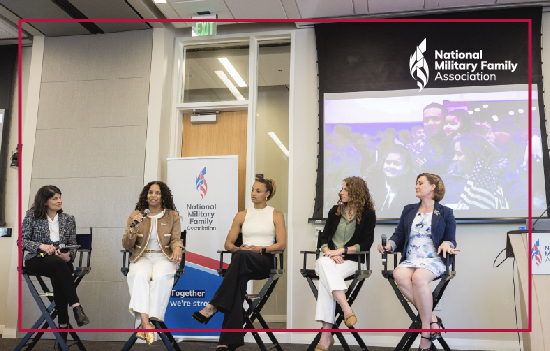NMFA’s State of the Military FamilySM Summit Examines the Cost of Service

Every military family has been there: sitting at the kitchen table, trying to plan for the future, not knowing when you’ll PCS. It’s impossible to predict how much money you’ll spend out of pocket in the course of the move, how you’ll manage to get your family settled, your bank account replenished, and find decent childcare. Will you be able to afford it?
For military families struggling to make ends meet, the stress can be overwhelming.
The 2024 State of the Military FamilySM Summit put the cost of service—and its toll on the family—front and center. Hosted by NMFA, this premiere event brings together military families, partners, and policy makers to explore these critical issues facing families.
Today’s event was full of military spouses lifting their voices, sharing their wisdom, asking hard questions, and offering suggestions on how we can better support them through tough times.
In a panel moderated by military spouse and investigative journalist Laura Geller, Liz O’Brien, Vice President at Hiring Our Heroes, and Shannon Razsadin, Executive Director at Military Family Advisory Network, wove their personal experience as military spouses with their professional expertise to help the audience understand the challenges military families face establishing financial security and the careers necessary to achieve financial well-being. Wells Fargo economist Nicole Cervi shared the findings of her recently-released report outlining the financial disparity between military families and their civilian peers. You can read that report here.
One of the most eye-opening findings is that civilian households’ average income exceeded military households’ average income by nearly $14K in 2021.
But military families don’t serve our nation for the money. Four military spouses shared their commitment to service, our military, and our nation during our More Than A Spouse panel, moderated by CBS News reporter and Coast Guard spouse Natalie Brand.
Heidi Starr, a Marine Corps spouse, opened up about the challenges of caregiving, supporting kids with special needs, and restarting a career in so many entry-level jobs that growth can feel unattainable. Houston-based attorney, community advocate, and entrepreneur Reda Hicks talked about creating solutions that work with our lives and help us achieve our goals. Navy veteran and Marine Corps spouse Ailsa Emmel talked about the importance of women’s health, wearing a multitude of hats, and finding her passion supporting women in digital formats. Chantae McMillan, who is an Army spouse and also an Olympic athlete, was honest about how hard it can be to pursue two equally demanding careers – and how important it is to advocate for yourself and what your family needs, even when it’s at odds with military life.
While their stories were all unique and reflected the diverse talent of the military community, their challenges were the same: PCS moves in conflict with career plans, the challenges of child care, and how difficult it can be to manage all of the demands of military life, motherhood, and your own professional goals.
Their stories were mirrored in what Sharene Brown, the Spouse of the 21st Chairman of the Joint Chiefs of Staff, shared during the event. Every day, she hears from military spouses from all walks of life with hopes, dreams, career goals, family challenges, and financial concerns—all balanced by a commitment to serve that is shared throughout our community.
But how do we support military spouse employment and strengthen our families’ financial security when our challenges are so similar but our experiences so unique? Catalest’s Scott Weiss, NMFA partner, and Human-Centered Design expert, helped us understand how design thinking can help us problem-solve in new ways—primarily by keeping military spouses at the center of all of our work, from learning through ideation and solution-building.
Keynote speaker Hilary Fordwich reminded us that no matter where we’re working to support military families, and no matter how close we are to living the challenges personally or understanding them through service and support, it’s up to us to make the changes military families need.
The problems military families face are not new, but the solutions must be. We owe it to our families to do whatever it takes to care for them the way they care for us every day.
Together, we’re stronger.




